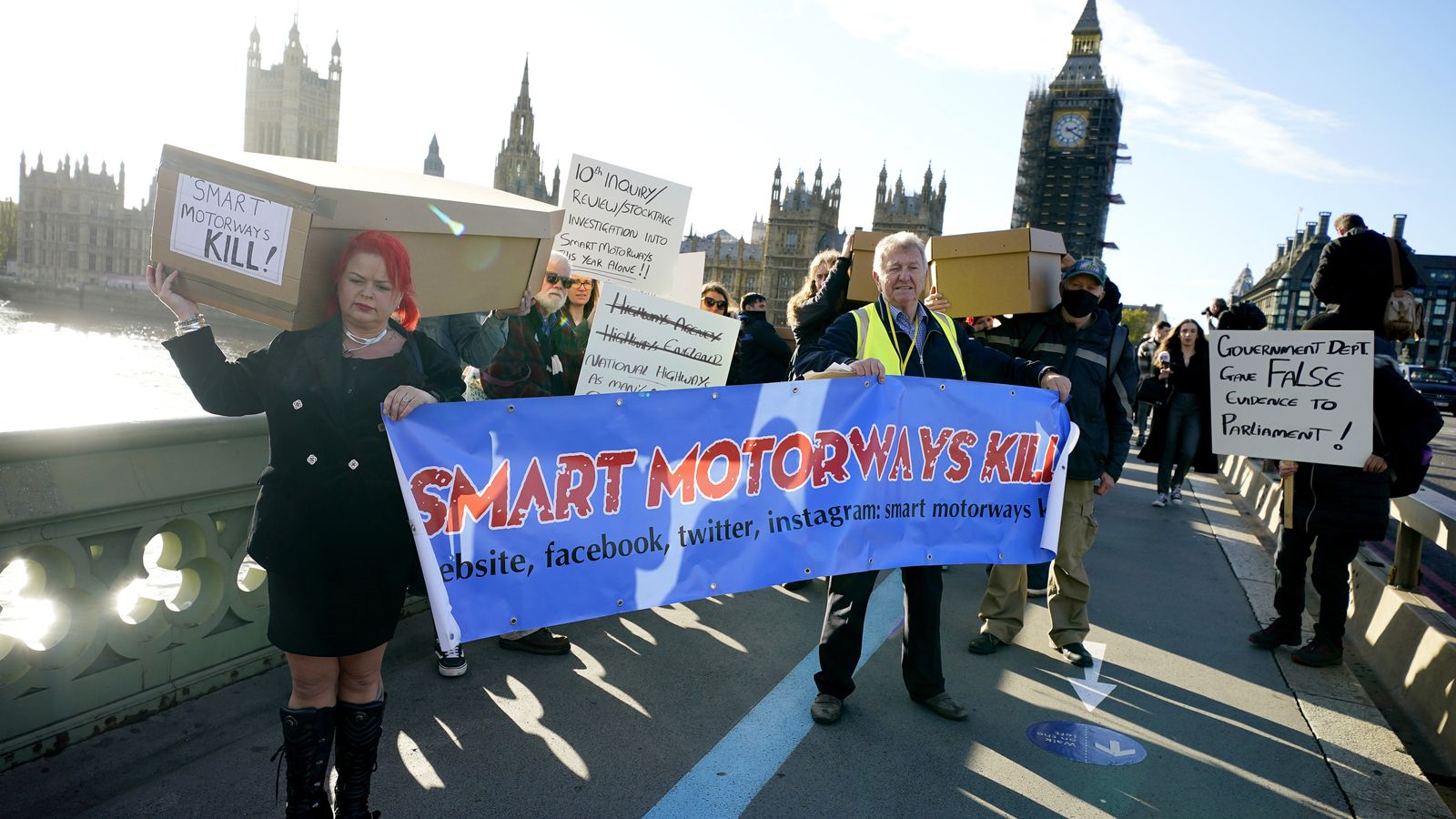Protesters carried coffins across Westminster Bridge in London to demonstrate against deaths on smart motorways introduced to try and ease congestion.
Around 50 people marched to Parliament Square on Monday to demand an end to the use of all-lane running (ALR) motorways, which use the hard shoulder as an additional lane during heavy traffic.
There has been increasing concern over the use of the motorways following several fatal accidents involving stationary vehicles being hit from behind.
The protests were led by Claire Mercer, whose husband Jason died on a section of the M1 that did not have a hard shoulder.
Mr Mercer, 44, and 22-year-old Alexandru Murgeanu, died near Sheffield when a lorry crashed into their vehicles which had stopped on the motorway following a “minor shunt” in June 2019.
Mrs Mercer said the protests were to voice frustration with the government at being “ignored”.
She said: “They keep doing review after review after review. In the meantime, people are still dying.
More than 500 e-scooters seized in just one week as police launch crackdown
Potholes: UK’s roads like ‘the surface of the moon’, after record rise in breakdowns, RAC says
Climate change: Carbon emissions from England’s £27.4bn roads scheme ‘100 times greater than government claims’, experts tell court
“There’s a really strong feeling against these. We need to embarrass the government into actually doing something.
“We don’t need a raft of changes. We just need the hard shoulder back in every single instance.”
The demonstrators carried 38 cardboard coffins along with placards reading “will you listen when it’s a coach full of school kids?”
Mrs Mercer, from Rotherham, said the number of coffins corresponds with the official number of people killed on smart motorways between 2014 and 2019.
She said: “The true figure is much much bigger.”
Jack Szwarc, 33, said he almost died on a smart motorway in April.
The 33-year-old from Wolverhampton, who was in a leg brace, said he came off his motorbike at 60mph on the M6 and had nowhere safe to escape when the engine died.
“Smart motorways almost cost me an arm and a leg,” he told PA news agency, describing how his bike slammed against the barrier, causing him to lose “a big chunk” of his leg, shatter his kneecap and dislocate his shoulder.
There are still seats on the coach left for Monday, leaving from Rotherham & Sheffield from 8:30am
I need as much company as possible, this will be my first time on a motorway, since …..
ALL info here https://t.co/O5v0yOZvTK pic.twitter.com/FGRPRTyFWZ
Labour MP Jim McMahon, the shadow transport secretary, said his party “would reintroduce the hard shoulder today”.
Speaking at the site of the protest in Parliament Square, he said: “Smart motorways have their role to play in increasing capacity and allowing traffic to flow more freely.
“Where we strongly disagree with the government is the idea that you can switch off the hard shoulder, that you can take away that vital safety net that gives people protection if they’re stranded.”
Follow the Daily podcast on Apple Podcasts, Google Podcasts, Spotify, Spreaker
National Highways, the government-owned company responsible for England’s motorways and major A roads, said the chance of death on smart motorways is less than on any other major road.
The company’s chief executive Nick Harris said: “Every road death is a tragic loss of life and our thoughts remain with those who have lost a loved one.
“Safety remains our top priority and our motorways are the safest type of road in the country.
“Data shows fatalities are less likely on smart motorways than on conventional ones, but we recognise concerns continue to be raised.
“We are determined to do all we can to help drivers feel safe and be safer on all our roads. We will work with drivers to make increasingly busy motorways safer for everyone who uses them.”
The Commons Transport Select Committee is due to publish a report on Tuesday on the rollout and safety of smart motorways.






















